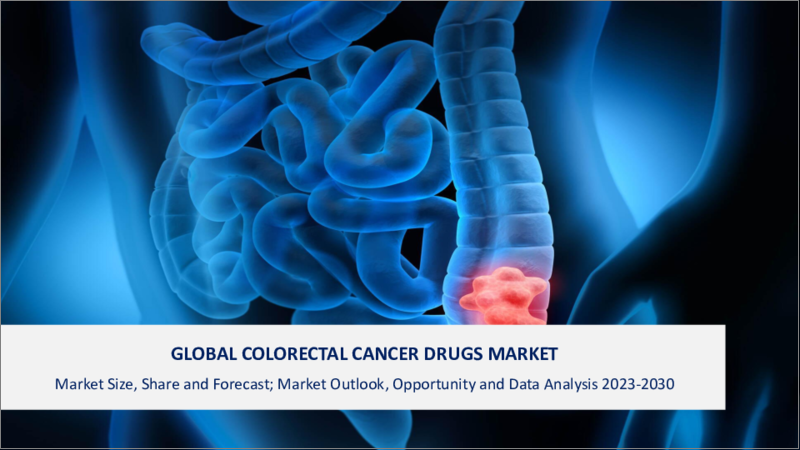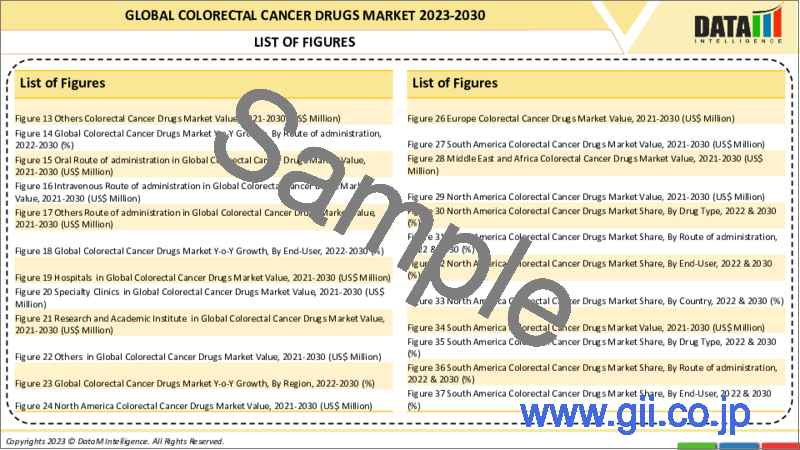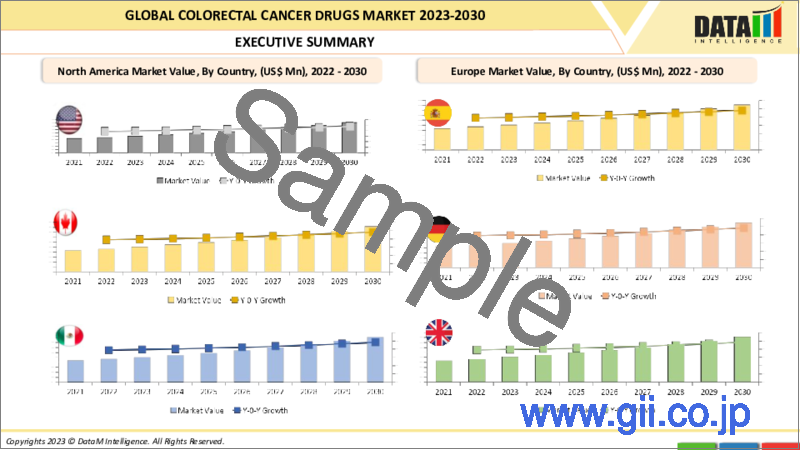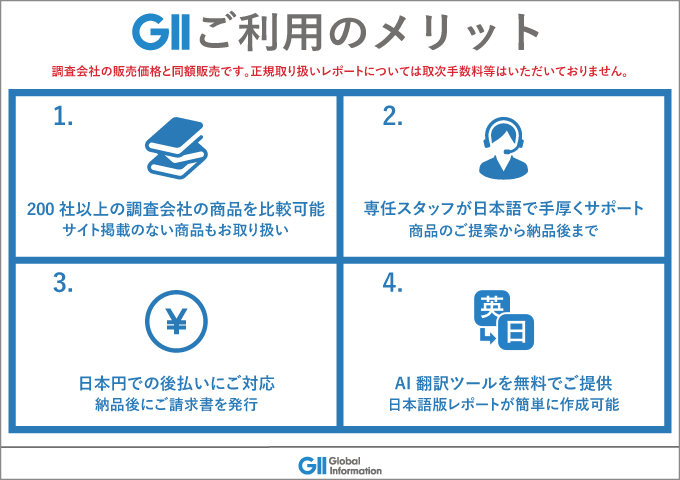|
|
市場調査レポート
商品コード
1290436
大腸がん治療薬の世界市場-2023-2030Global Colorectal Cancer Drugs Market - 2023-2030 |
||||||
|
● お客様のご希望に応じて、既存データの加工や未掲載情報(例:国別セグメント)の追加などの対応が可能です。 詳細はお問い合わせください。 |
|||||||
| 大腸がん治療薬の世界市場-2023-2030 |
|
出版日: 2023年06月12日
発行: DataM Intelligence
ページ情報: 英文 195 Pages
納期: 約2営業日
|
- 全表示
- 概要
- 目次
市場概要
大腸がん治療薬の世界市場は、2022年に136億米ドルに達し、2030年には181億米ドルに達することで有利な成長を遂げると予測されています。大腸がん治療薬の世界市場は、2023年から2030年の予測期間中に3.7%のCAGRを示すと予測されています。
大腸がん治療薬は、結腸や直腸を侵す大腸がんを治療するための様々な治療オプションを包含しています。これらの薬剤は、腫瘍の成長を抑制し、がん細胞の拡散を防ぎ、患者の転帰を改善します。大腸がんの治療に用いられる主な薬剤には、化学療法、免疫療法、その他の併用療法が含まれます。
さらに、大腸がんに関与する特定の遺伝子変異や分子経路が特定されたことにより、標的療法の開発が進んでいます。研究者は、治療成果を高めるために異なる薬剤を組み合わせることの利点を探求しており、臨床試験の実施により新薬や治療レジメンを評価できることが、予測期間中に大腸がん治療薬を牽引すると予想される要因となっています。
市場力学
大腸がん治療薬の臨床試験の増加は、予測期間中の世界の大腸がん治療薬市場の成長を後押ししています
2022年9月、ファイザーは、Merck KGaA、小野薬品工業、Pierre Fabreと共同で、BEACON CRC試験のスポンサーとなりました。この試験では、BRAF V600Eと呼ばれる特定の遺伝子変異を有する治療歴のある転移性大腸がん(mCRC)患者を対象に、標準治療と比較したエンコラフェニブ+セツキシマブ±ビニメチニブのレジメンの有効性を評価しました。
無作為化第III相BEACON試験(NCT02928224)では、encorafenib+cetuximab±binimetinibレジメンが、対照群と比較して全生存期間と客観的奏効率を改善することが示されました。この知見は、BRAF V600E変異型mCRCに対するこの併用療法の有効性を示す証拠となりました。
ctDNA解析により、BRAFおよびEGFRを阻害した後、MEK阻害の有無にかかわらず、MAPK経路の再活性化が共通の耐性メカニズムであることが示されました。RAS-MEKシグナル伝達経路の後天的変異は、ダブレットレジメン(エンコラフェニブ+セツキシマブ)治療を受けた患者でより頻繁に観察され、受容体シグナルの増強はトリプレットレジメン(エンコラフェニブ+セツキシマブ+ビニメチニブ)を受けた患者でより多く観察されました。
大腸がん治療薬のコストが高いことが、予測期間における大腸がん治療薬の世界市場の成長を妨げています
米国疾病管理予防センターによると、大腸がんの治療費はすべてのがんの種類の中で2番目に高く、がん治療に関連する総費用の12.6%を占めています。
医療サービスは237億米ドルで、処方薬は6億米ドルでした。さらに、経口処方薬については、患者1人当たりの平均費用は、人生の最終年度に最も多く(1,400ドル)、次いで初期治療段階(400ドル)、継続治療段階(約200ドル)であることが判明しました。このように、上記の要因から、予測期間中、市場は低迷することが予想されます。
COVID-19の影響分析
大腸がん治療薬市場は、COVID-19の大流行により大きな混乱を経験しました。世界中のヘルスケアシステムが影響を受け、がん検診、診断、治療の遅れにつながっています。大腸がん治療薬の臨床試験も影響を受け、患者の安全を確保し、パンデミック関連の制限を遵守するために、多くの臨床試験が延期、遅延、変更されました。
その結果、新薬の開発・導入が遅れました。さらに、パンデミックの経済的影響は、ヘルスケアシステムや個人に経済的制約をもたらし、大腸がん治療薬の価格や入手のしやすさに影響を与える可能性があります。これらの複合的な要因が、大腸がん治療薬市場のダイナミクスに顕著な影響を与えています。
ロシア・ウクライナ紛争分析
ロシアとウクライナの紛争は、ウクライナの大腸がん治療薬の入手に大きな影響を与えています。紛争以前、ウクライナは抗がん剤を含む医薬品の輸入をロシアに大きく依存していました。しかし、紛争とその後の貿易制限により、これらの医薬品へのアクセスが制限され、大腸がんの治療に使用される医薬品を含む重要な医薬品の不足につながりました。
この不足の結果、患者さんは必要な医薬品を入手できず、治療の遅れや効果の低い代替薬の使用につながっています。さらに、輸入医薬品の価格が上昇し、患者さんやヘルスケアシステムにとって購入しにくいものとなってしまいました。さらに、ウクライナ通貨の切り下げにより、他国からの医薬品購入が困難になり、状況はさらに深刻化しました。
ロシア・ウクライナ紛争が大腸がん治療薬市場に与えた影響は、世界な医薬品サプライチェーンの潜在的な脆弱性を浮き彫りにしています。また、自給率を高め、輸入医薬品への依存度を下げるために、医薬品の供給源を多様化し、現地の医薬品産業を発展させることの重要性が浮き彫りになっています。
目次
第1章 調査手法と範囲
- 調査手法
- 調査目的および調査範囲
第2章 定義と概要
第3章 エグゼクティブサマリー
第4章 市場力学
- 影響要因
- 促進要因
- 大腸がん治療薬の臨床試験の増加
- 抑制要因
- 大腸がん治療薬の高価格化
- 機会
- 分子特性に特異的に対処する標的治療薬の開発への注目の高まり
- 影響分析
- 促進要因
第5章 産業分析
- ポーターの5フォース分析
- サプライチェーン分析
- アンメットニーズ
- 法規制分析
第6章 COVID-19の分析
第7章 ロシア・ウクライナ戦争分析
第8章 タイプ別
- 血管内皮細胞増殖因子(VEGF)阻害剤
- 上皮成長因子受容体(EGFR)阻害剤
- プログラム細胞死蛋白質1/PD1リガンド1(PD1/PDL1)阻害剤
- BRAF/MEK阻害剤
- チロシンキナーゼ(TKI)阻害剤
- 免疫調節剤
- その他
第9章 治療法別
- 免疫療法
- 標的治療薬
- 化学療法
- その他
第10章 エンドユーザー別
- 病院
- 専門医院
- 研究機関
- その他
第11章 流通チャネル別
- 病院内薬局
- 小売薬局
- オンライン薬局
第12章 地域別
- 北米
- 米国
- カナダ
- メキシコ
- 欧州
- ドイツ
- 英国
- フランス
- イタリア
- スペイン
- その他欧州
- 南米
- ブラジル
- アルゼンチン
- その他南米地域
- アジア太平洋地域
- 中国
- インド
- 日本
- オーストラリア
- その他アジア太平洋地域
- 中東・アフリカ地域
第13章 競合情勢
- 競合シナリオ
- 製品ベンチマーク
- 企業シェア分析
- 主な発展と戦略
第14章 企業プロファイル
- Genentech, Inc.
- 会社概要
- 製品ポートフォリオと説明
- 財務概要
- 主な発展状況
- Eli Lilly and Company
- Pfizer
- Sanofi S.A.
- Bristol-Myers Squibb
- Amgen
- Merck & Co., Inc.
- Teva Pharmaceuticals
- Novartis
- GlaxoSmithKline
第15章 付録
Market Overview
The Global Colorectal Cancer Drugs Market reached US$ 13.6 billion in 2022 and is projected to witness lucrative growth by reaching up to US$ 18.1 billion by 2030. The Global Colorectal Cancer Drugs Market is expected to exhibit a CAGR of 3.7% during the forecast period 2023-2030.
Colorectal cancer drugs encompass a range of therapeutic options for treating colorectal cancer, which affects the colon or rectum. These drugs inhibit tumor growth, prevent cancer cells from spreading, and improve patient outcomes. The major drug classes and specific medications used to treat colorectal cancer include chemotherapy, immunotherapy, and other combination drugs.
Furthermore, the identification of specific genetic mutations and molecular pathways implicated in colorectal cancer has led to the development of targeted therapies; researchers are exploring the benefits of combining different drugs to enhance treatment outcomes and the conduct of clinical trials allows for the evaluation of new medicines and treatment regimens are the factors expected to drive the colorectal cancer drugs over the forecast period.
Market Dynamics
The increasing clinical trial for colorectal cancer drugs is boosting the growth of the Global Colorectal Cancer Drug Market during the forecast period.
In September 2022, Pfizer, in collaboration with Merck KGaA, ONO Pharmaceutical, and Pierre Fabre, sponsored the BEACON CRC study. The study evaluated the effectiveness of encorafenib + cetuximab ± binimetinib regimens compared to standard of care in patients with previously treated metastatic colorectal cancer (mCRC) with a specific genetic mutation called BRAF V600E.
The randomized phase III BEACON study (NCT02928224) demonstrated that the encorafenib + cetuximab ± binimetinib regimens improved overall survival and objective response rate compared to the control group. This finding provided evidence for the efficacy of this combination therapy in treating BRAF V600E-mutant mCRC.
The ctDNA analysis demonstrated that reactivation of the MAPK pathway is a common resistance mechanism after inhibiting BRAF and EGFR, with or without MEK inhibition. Acquired mutations in the RAS-MEK signaling pathway were more frequently observed in patients treated with the doublet regimen (encorafenib + cetuximab), while enhanced receptor signaling was more prevalent in those receiving the triplet regimen (encorafenib + cetuximab + binimetinib).
The high costs of drugs for colorectal cancer are hampering the growth of the Global Colorectal Cancer Drugs Market in the forecast period.
According to the Centers for Disease Control and Prevention, the treatment expenses for colorectal cancer rank second highest among all types of cancer, comprising 12.6% of the total costs associated with cancer treatment.
Medical services accounted for $23.7 billion, while prescription drugs contributed $0.6 billion to these expenses. Furthermore, in terms of oral prescription drugs, the average costs per patient were found to be the greatest during the final year of life ($1,400), followed by the initial care phase ($400), and the continuing care phase (approximately $200). Thus, owing to the above factors, the market is expected to hamper over the forecast period.
COVID-19 Impact Analysis
The colorectal cancer drugs market has experienced significant disruptions due to the COVID-19 pandemic. Healthcare systems globally have been impacted, leading to delays in cancer screenings, diagnosis, and treatments. Clinical trials for colorectal cancer drugs were also affected, with many being postponed, delayed, or modified to ensure patient safety and comply with pandemic-related restrictions.
Consequently, the development and introduction of new drugs have been slowed down. Additionally, the economic impact of the pandemic has created financial constraints for healthcare systems and individuals, potentially influencing the affordability and accessibility of colorectal cancer drugs. These combined factors have notably impacted the dynamics of the colorectal cancer drugs market.
Russia-Ukraine Conflict Analysis
The ongoing conflict between Russia and Ukraine has significantly impacted the availability of colorectal cancer drugs in Ukraine. Before the conflict, Ukraine relied heavily on Russia to import pharmaceuticals, including cancer drugs. However, following the conflict and subsequent trade restrictions, access to these drugs became limited, leading to a shortage of critical medications, including those used to treat colorectal cancer.
As a result of this shortage, patients have been unable to access essential drugs, leading to treatment delays and the use of alternative, less effective drugs. Additionally, the cost of imported drugs increased, making them less affordable for patients and healthcare systems. The situation was further compounded by the devaluation of the Ukrainian currency, making purchasing drugs from other countries more challenging.
The impact of the Russia-Ukraine conflict on the colorectal cancer drugs market highlights the potential vulnerabilities of global pharmaceutical supply chains. It underscores the importance of diversifying the sources of drug supplies and developing local pharmaceutical industries to enhance self-sufficiency and reduce dependence on imported drugs.
Segment Analysis
The Global Colorectal Cancer Drugs Market is segmented based on type, therapy, end user, distribution channel, and region.
The vascular endothelial growth factor (VEGF) inhibitors segment is expected to dominate the market over the forecast period.
The vascular endothelial growth factor (VEGF) inhibitors segment accounted for the highest market stake, accounting for approximately 1/3rd of the colorectal cancer drugs market in 2022. Vascular endothelial growth factor (VEGF) inhibitors have several advantages in the treatment of colorectal cancer. It works by blocking the activity of VEGF, a protein that promotes the formation of new blood vessels (angiogenesis).
For instance, Bevacizumab (BEV), ramucirumab (RAM), and aflibercept (AFL), are widely used for metastatic colorectal cancer (mCRC) patients who are treated with second-line chemotherapy.
Additionally, VEGF inhibitors are often used in combination with chemotherapy in the treatment of colorectal cancer. Studies have shown that adding VEGF inhibitors to chemotherapy regimens improves treatment response rates and overall survival compared to chemotherapy alone. This combination therapy approach can lead to more effective tumor control and increased patient outcomes.
Geographical Analysis
The increasing acquisitions by the market players, the growing prevalence of colorectal cancer, and rising product launches by the market players dominate the North American region.
North America is expected to dominate the catheter stabilization devices market, accounting for around 1/3rd of this market, with the U.S. being the major contributor.
According to the recent Colorectal Cancer Statistics 2023 report by the American Cancer Society (ACS), there has been a notable shift in colorectal cancer trends in the United States. The report reveals that the proportion of individuals diagnosed with advanced-stage colorectal cancer (CRC) has increased from 52% in the mid-2000s to 60% in 2019.
Moreover, the diagnoses of individuals under the age of 55 have doubled from 11% in 1995 to 20% in 2019, indicating a concerning rise in colorectal cancer among younger age groups. Overall, the report estimates that in 2023, approximately 153,020 people in the United States will receive a diagnosis of colorectal cancer, and 52,550 individuals will succumb to the disease. These figures highlight the significant impact and continued threat posed by colorectal cancer.
Furthermore, on March 13, 2023, Pfizer Inc. and Seagen Inc. announced that they have entered into a definitive merger agreement under which Pfizer will acquire Seagen, a global biotechnology company that discovers, develops, and commercializes transformative cancer medicines, for $229 in cash per Seagen share for a total enterprise value of $43 billion.
Hence , the North American region is expected to hold the largest market share over the forecast period due to the above factors.
Competitive Landscape
The major global players in the market include: Genentech, Inc., Eli Lilly, and Company, Pfizer, Abbott Laboratories, Sanofi S.A., Bristol-Myers Squibb, Amgen, Bristol-Myers Squib, Merck & Co., Inc., Teva Pharmaceuticals, Novartis, GlaxoSmithKline, Onyx among others.
Why Purchase the Report?
- To visualize the Global Colorectal Cancer Drugs Market segmentation based on the type, therapy, end user, distribution channel, and region and understand key commercial assets and players.
- Identify commercial opportunities by analyzing trends and co-development.
- Excel data sheet with numerous data points of colorectal cancer drugs market-level with all segments.
- PDF report consists of a comprehensive analysis after exhaustive qualitative interviews and an in-depth study.
- Product mapping available as Excel consisting of key products of all the major players.
The Global Colorectal Cancer Drugs Market Report Would Provide Approximately 69 Tables, 72 Figures And 195 Pages.
Target Audience 2023
- Manufacturers/ Buyers
- Industry Investors/Investment Bankers
- Research Professionals
- Emerging Companies
Table of Contents
1. Methodology and Scope
- 1.1. Research Methodology
- 1.2. Research Objective and Scope of the Report
2. Definition and Overview
3. Executive Summary
- 3.1. Snippet by Type
- 3.2. Snippet by Therapy
- 3.3. Snippet by End User
- 3.4. Snippet by Distribution Channel
- 3.5. Snippet by Region
4. Dynamics
- 4.1. Impacting Factors
- 4.1.1. Drivers
- 4.1.1.1. The increasing clinical trial for colorectal cancer drugs
- 4.1.2. Restraints
- 4.1.2.1. The high costs of drugs for colorectal cancer
- 4.1.3. Opportunity
- 4.1.3.1. Growing focus on developing targeted therapies that specifically address the molecular characteristics
- 4.1.4. Impact Analysis
- 4.1.1. Drivers
5. Industry Analysis
- 5.1. Porter's 5 Forces Analysis
- 5.2. Supply Chain Analysis
- 5.3. Unmet Needs
- 5.4. Regulatory Analysis
6. COVID-19 Analysis
- 6.1. Analysis of COVID-19
- 6.1.1. Before COVID-19 Scenario
- 6.1.2. Present COVID-19 Scenario
- 6.1.3. Post COVID-19 or Future Scenario
- 6.2. Pricing Dynamics Amid COVID-19
- 6.3. Demand-Supply Spectrum
- 6.4. Government Initiatives Related to the Market During the Pandemic
- 6.5. Manufacturers' Strategic Initiatives
- 6.6. Conclusion
7. Russia-Ukraine War Analysis
8. By Type
- 8.1. Introduction
- 8.1.1. Market Size Analysis and Y-o-Y Growth Analysis (%), By Type
- 8.1.2. Market Attractiveness Index, By Type
- 8.2. Vascular Endothelial Growth Factor (VEGF) Inhibitors*
- 8.2.1. Introduction
- 8.2.2. Market Size Analysis and Y-o-Y Growth Analysis (%)
- 8.3. Epidermal Growth Factor Receptor (EGFR) Inhibitors
- 8.4. Programmed Cell Death Protein 1/PD1 Ligand 1 (PD1/PDL1) Inhibitors
- 8.5. BRAF Or MEK Inhibitors
- 8.6. Tyrosine Kinase (TKI) Inhibitors
- 8.7. Immunomodulators
- 8.8. Others
9. By Therapy
- 9.1. Introduction
- 9.1.1. Market Size Analysis and Y-o-Y Growth Analysis (%), By Therapy
- 9.1.2. Market Attractiveness Index, By Therapy
- 9.2. Immunotherapy*
- 9.2.1. Introduction
- 9.2.2. Market Size Analysis and Y-o-Y Growth Analysis (%)
- 9.3. Targeted therapy
- 9.4. Chemotherapy
- 9.5. Others
10. By End User
- 10.1. Introduction
- 10.1.1. Market Size Analysis and Y-o-Y Growth Analysis (%), By End User
- 10.1.2. Market Attractiveness Index, By End User
- 10.2. Hospital*
- 10.2.1. Introduction
- 10.2.2. Market Size Analysis and Y-o-Y Growth Analysis (%)
- 10.3. Specialty Clinics
- 10.4. Research Institute
- 10.5. Others
11. By Distribution Channel
- 11.1. Introduction
- 11.1.1. Market Size Analysis and Y-o-Y Growth Analysis (%), By Distribution Channel
- 11.1.2. Market Attractiveness Index, By Distribution Channel
- 11.2. Hospital Pharmacies*
- 11.2.1. Introduction
- 11.2.2. Market Size Analysis and Y-o-Y Growth Analysis (%)
- 11.3. Retail Pharmacies
- 11.4. Online Pharmacies
12. By Region
- 12.1. Introduction
- 12.1.1. Market Size Analysis and Y-o-Y Growth Analysis (%), By Region
- 12.1.2. Market Attractiveness Index, By Region
- 12.2. North America
- 12.2.1. Introduction
- 12.2.2. Key Region-Specific Dynamics
- 12.2.3. Market Size Analysis and Y-o-Y Growth Analysis (%), By Type
- 12.2.4. Market Size Analysis and Y-o-Y Growth Analysis (%), By Therapy
- 12.2.5. Market Size Analysis and Y-o-Y Growth Analysis (%), By End User
- 12.2.6. Market Size Analysis and Y-o-Y Growth Analysis (%), By Distribution Channel
- 12.2.7. Market Size Analysis and Y-o-Y Growth Analysis (%), By Country
- 12.2.7.1. The U.S.
- 12.2.7.2. Canada
- 12.2.7.3. Mexico
- 12.3. Europe
- 12.3.1. Introduction
- 12.3.2. Key Region-Specific Dynamics
- 12.3.3. Market Size Analysis and Y-o-Y Growth Analysis (%), By Type
- 12.3.4. Market Size Analysis and Y-o-Y Growth Analysis (%), By Therapy
- 12.3.5. Market Size Analysis and Y-o-Y Growth Analysis (%), By End User
- 12.3.6. Market Size Analysis and Y-o-Y Growth Analysis (%), By Distribution Channel
- 12.3.7. Market Size Analysis and Y-o-Y Growth Analysis (%), By Country
- 12.3.7.1. Germany
- 12.3.7.2. The U.K.
- 12.3.7.3. France
- 12.3.7.4. Italy
- 12.3.7.5. Spain
- 12.3.7.6. Rest of Europe
- 12.4. South America
- 12.4.1. Introduction
- 12.4.2. Key Region-Specific Dynamics
- 12.4.3. Market Size Analysis and Y-o-Y Growth Analysis (%), By Type
- 12.4.4. Market Size Analysis and Y-o-Y Growth Analysis (%), By Therapy
- 12.4.5. Market Size Analysis and Y-o-Y Growth Analysis (%), By End User
- 12.4.6. Market Size Analysis and Y-o-Y Growth Analysis (%), By Distribution Channel
- 12.4.7. Market Size Analysis and Y-o-Y Growth Analysis (%), By Country
- 12.4.7.1. Brazil
- 12.4.7.2. Argentina
- 12.4.7.3. Rest of South America
- 12.5. Asia-Pacific
- 12.5.1. Introduction
- 12.5.2. Key Region-Specific Dynamics
- 12.5.3. Market Size Analysis and Y-o-Y Growth Analysis (%), By Type
- 12.5.4. Market Size Analysis and Y-o-Y Growth Analysis (%), By Therapy
- 12.5.5. Market Size Analysis and Y-o-Y Growth Analysis (%), By End User
- 12.5.6. Market Size Analysis and Y-o-Y Growth Analysis (%), By Distribution Channel
- 12.5.7. Market Size Analysis and Y-o-Y Growth Analysis (%), By Country
- 12.5.7.1. China
- 12.5.7.2. India
- 12.5.7.3. Japan
- 12.5.7.4. Australia
- 12.5.7.5. Rest of Asia-Pacific
- 12.6. Middle East and Africa
- 12.6.1. Introduction
- 12.6.2. Key Region-Specific Dynamics
- 12.6.3. Market Size Analysis and Y-o-Y Growth Analysis (%), By Type
- 12.6.4. Market Size Analysis and Y-o-Y Growth Analysis (%), By Therapy
- 12.6.5. Market Size Analysis and Y-o-Y Growth Analysis (%), By End User
- 12.6.6. Market Size Analysis and Y-o-Y Growth Analysis (%), By Distribution Channel
13. Competitive Landscape
- 13.1. Competitive Scenario
- 13.2. Product Benchmarking
- 13.3. Company Share Analysis
- 13.4. Key Developments and Strategies
14. Company Profiles
- 14.1. Genentech, Inc.*
- 14.1.1. Company Overview
- 14.1.2. Product Portfolio and Description
- 14.1.3. Financial Overview
- 14.1.4. Key Developments
- 14.2. Eli Lilly and Company
- 14.3. Pfizer
- 14.4. Sanofi S.A.
- 14.5. Bristol-Myers Squibb
- 14.6. Amgen
- 14.7. Merck & Co., Inc.
- 14.8. Teva Pharmaceuticals
- 14.9. Novartis
- 14.10. GlaxoSmithKline
LIST NOT EXHAUSTIVE
15. Appendix
- 15.1. About Us and Services
- 15.2. Contact Us




